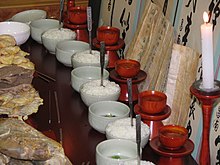Jesa
Rooted in the belief that the spirits of ancestors continue to influence the living, Jesa serves as a way to maintain a connection with the past and seek blessings for the present and future.
In the context of Dangun, the founder of the first Korean kingdom, Gojoseon, Jesa rituals were likely integral to the societal and spiritual practices of that time.
The rituals typically involve the preparation of specific foods, drinks, and other symbolic items, which are arranged on an ancestral altar.
In essence, Jesa serves as a bridge between the living and the deceased, emphasizing the importance of familial and ancestral connections in Korean society.
[9][better source needed] The Jecheon event has been inherited from Dangun Joseon to Yeonggo (迎鼓) in Buyeo, Mucheon (舞天) in Dongye, Alliance of Goguryeo (東盟), Jingungjesa (Silla), and Palgwanhoe (八關會) in Goryeo.
However, when Joseon started paying tribute to China and adopted Confucianism as its ruling ideology, the heavenly culture ceases to exist.
There are several kinds of ancestor rituals such as gijesa (기제사, 忌祭祀), charye (차례, 茶禮), seongmyo (성묘, 省墓), and myosa (묘사, 墓祀).
Finally Myosa are performed at the tomb site in the lunar month of October to conduct in memory of old ancestors (five or more generations).
Ancestral rites are typically divided into 3 categories:[15] To perform ancestor rituals, the family at the eldest son's house prepare many kinds of food such as wine, taro soup, beef, fish, three different colored vegetables, many kinds of fruits, and songpyeon(rice cake), particularly those that were favored by the deceased.
[4] The shinwi (신위, 神位) or memorial tablet, which symbolizes the spiritual presence of the ancestor, is placed at the center of the table.
Today, in most Korean families, ancestor rituals still remain an important part of their culture and they are faithfully observed.
They were a common late-night snack for yangban scholars known as seonbi, and many restaurants in Andong still serve heotjesatbap today.


